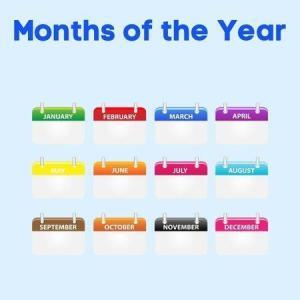Days Of The Week, Months Of The Year, Seasons, Weather, And Time In Basque
Here at Language Hobo, we’re interested in teaching you the basics of your new language, so you’ll be able to build a strong foundation to work from as you progress.
That’s why we think introducing you to commonly-used Basque words related to the passage of time is a great place to start. These include the Basque names for days, months, seasons, weather conditions, and other time-related words.
Most of the vocabulary on this list will show up often in conversation, so it’s important to learn them early on. Not only will you need to know how to describe when something occurs, but you might also want to talk about the weather at some point, a topic that goes hand in hand with the passage of time.
In this post, you’ll find a comprehensive list of words and phrases that you’ll encounter frequently, and that will provide greater depth to your Basque conversation skills. We’ve split everything up into convenient categories for easy perusal.

Days of the Week in Basque
In this section, we’ll introduce you to the names of the 7 days of the week in Basque. They won’t look at all familiar, but we think they’re relatively easy to remember.
| Days of the Week (English) | Asteko egunak (Basque) |
|---|---|
| What’s the day today? | Zer egun da gaur? |
| Monday | Astelehena |
| Tuesday | Asteartea |
| Wednesday | Asteazkena |
| Thursday | Osteguna |
| Friday | Ostirala |
| Saturday | Larunbata |
| Sunday | Igandea |
Watch this short video to hear how the Basque days of the week are pronounced.
Months of the Year in Basque
Next, we’ll take a look at the 12 months of the year in Basque. A couple of them might sound familiar, but for the most part they’re quite different from the English names you’re used to, so they might take a bit more effort to learn.
| Months of the Year (English) | Urteko hilabeteak (Basque) |
|---|---|
| January | Urtarrila |
| February | Otsaila |
| March | Martxoa |
| April | Apirila |
| May | Maiatza |
| June | Ekaina |
| July | Uztaila |
| August | Abuztua |
| September | Iraila |
| October | Urria |
| November | Azaroa |
| December | Abendua |
Seasons in Basque
Here, we’ll introduce you to the names of seasons in the Basque language. There are, of course, only 4 of them, so you shouldn’t have too much trouble remembering them. “Summer” especially is a breeze!
| Seasons (English) | Urtaroak (Basque) |
|---|---|
| Spring | Udaberria |
| Summer | Uda |
| Autumn (Fall) | Udazkena |
| Winter | Negua |
The Weather in Basque
We couldn’t exactly teach you the names of the seasons and not include the weather, now could we? These two things tend to go together, so it makes sense to learn the vocabulary for both at the same time.
| Weather (English) | Eguraldi (Basque) |
|---|---|
| Rain | Euria |
| Snow | Elurra |
| Sun | Eguzkia |
| Wind | Haizea |
| Clouds | Hodeiak |
| Fog | Lainoa |
| Lightning | Tximista |
| Thunder | Trumoia |
| Storm | Eraitza |
| Hot | Bero |
| Cold | Hotz |
Time in Basque
In this section, we’ll introduce you to some common time-related terms in Basque. We mean time in its most abstract sense here, so you’ll learn words like “day” and “minute” but also more general concepts like “now” and “later.”
| Time (English) | Denbora (Basque) |
|---|---|
| morning | goiza |
| afternoon | arratsaldea |
| evening | gaua |
| night | gaua |
| midnight | gauerdia |
| dusk | ilunabar |
| dawn | egunsentia |
| second | segundo |
| minute | minutua |
| hour | ordua |
| day | eguna |
| week | astea |
| weekend | asteburu |
| month | hilabetea |
| year | urtea |
| decade | hamarkada |
| century | mendea |
| today | gaur |
| yesterday | atzo |
| tomorrow | bihar |
| tonight | gaur gauean |
| late | berandu |
| early | goiz |
| now | orain |
| soon | laster |
Telling the Time in Basque
You’ll also want to know how to tell the time. While this aspect of language learning can be one of the more tricky things to get your head around, we think you’ll find it manageable with a little practice.
Telling the time in Basque isn’t overly complicated. As long as you’re already familiar with numbers in Basque, you shouldn’t have too many issues remembering how to structure your time sentences.
When you want to say the exact hour with no minutes past or before, for hours two – twelve, you’d take the number and add the suffix “-rak” if the number ends in “u”, or “-ak” if it doesn’t. Finally, you end the sentence with “dira”, which means “is/are”. For example:
- It’s four o’clock – laurak dira
- It’s six o’clock – seiak dira
It should also be noted that for one and two o’clock, the word “ordu” precedes the number. This isn’t needed with the rest of the hours. For example:
- It’s one o’clock – ordu bata da. No “-ak” suffix is needed, as “one” is singular
- It’s two o’clock – ordu biak dira
To talk about minutes past the hour, you’d use the Basque word for “and”, which is “eta”, so that the sentence is framed as “hour and minutes”. Look at the example below:
- ten past four (4:10) – laurak eta hamar [dira]
- twenty-seven minutes past five (5:27) – bostak eta hogeita zazpi [dira]
To say minutes to the hour, you’d use the Basque word for “less”, which is “gutxi”, so that the sentence is framed as “hour minutes less”. Check out the example below:
- five to three (2:55) – hirurak bost gutxi
- eight minutes to nine – bederatziak zortzi gutxi
Half past the hour and a quarter past the hour, as they’re also fractions, have their own special names in Basque, which are “erdia” for “half”, and “laurden” respectively. You can see them in action in the table below.
Saying “midnight” in Basque
Being able to distinguish between “noon” and “midnight” is pretty important, and luckily Basque
has a term for twelve o’clock at night, which is “gaueko hamabiak”.
| What’s the time? | Zer ordu da? |
|---|---|
| [It’s] three o’clock | Hirurak dira |
| [It’s] 6:30 | Sei eta erdiak |
| Quarter to eight | Zortziak laurden gutxi |
| Quarter past five | Bost eta laurdenak / Bostak eta laurden |
We hope you enjoyed this lesson on days, months, seasons, weather, and time in Basque. There’s a lot to remember, so we suggest taking your time with the vocabulary, focusing on one section at a time, and familiarizing yourself with it before moving on to the next.
When you’re ready to learn some more Basque vocabulary, we’ve got some great stuff for you to peruse. Check out Basque Language Basics: Useful Phrases for Beginners, and Body Parts and Clothes in Basque.
Agur!








